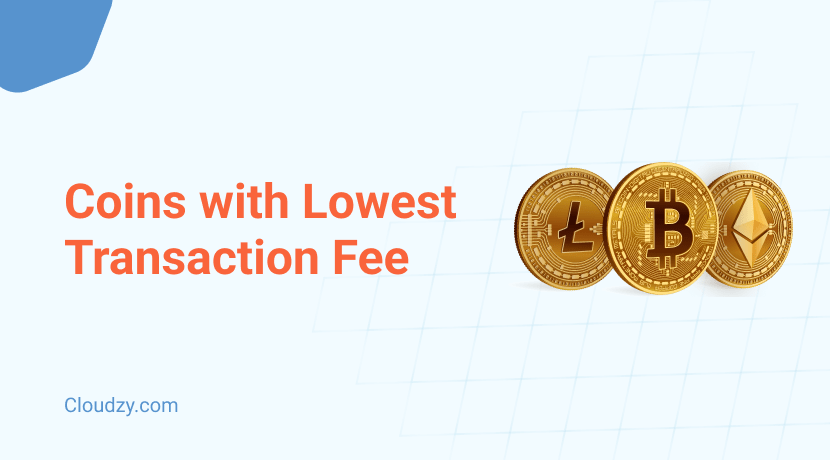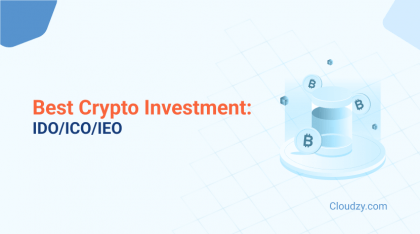Crypto transaction fees can feel like a burden, especially when high fees eat into the value of the transaction itself. It doesn’t even matter if you’re trading or just experimenting with new wallets—these fees can add up quickly. However, not all cryptocurrencies have high transaction costs—some are designed to be much cheaper to transfer, making them more practical for everyday use.
Transaction fees are essential for maintaining the security and functionality of blockchain networks, paying miners or validators who process and validate transactions. Fees can vary based on factors like network congestion, transaction size, and the blockchain’s design. For example, Ethereum’s gas system can cause fees to spike, especially during times of high demand, while networks like Solana optimize for lower transaction fees by design.
For businesses, remittance senders, and everyday users, high transaction fees can negate the advantages of using crypto in the first place. In this guide, we’ll focus on the cheapest crypto to transfer, helping users save money while making crypto more accessible to all.
Top Cryptocurrencies with the Lowest Transaction Fees
Alright, we’ve discussed why transaction fees are such a big deal—now it’s time to talk solutions. Let’s cut straight to the point: not all cryptos are highway robbers when it comes to fees. Some are fast, cheap, and downright practical for everyday use. These options rank highly as crypto with lowest transaction fees, making them perfect for frequent users. Others? Well, they’ll have you questioning your life choices after one transaction.
This section is all about the cheapest crypto to transfer. I’ve pulled together a mix of popular names and underrated gems—because sometimes the best low-fee options aren’t the ones hogging the spotlight. Whether you’re sending a quick $5 to a friend or paying for something online, these cryptocurrencies won’t break the bank.
| Cryptocurrency | Average Transaction Fee | Transaction Time | Use Cases |
| Nano (NANO) | $0.00 | Instant |
Microtransactions, everyday payments.
|
| Stellar (XLM) | $0.00 | 3–5 seconds |
International remittances.
|
| Ripple (XRP) | $0.00 | ~4 seconds |
Fast, global financial transactions.
|
| Solana (SOL) | $0.00 | ~2.5 seconds |
dApp transactions, NFT trading.
|
| Litecoin (LTC) | $0.03–$0.04 | ~2.5 minutes |
Everyday transactions.
|
| Bitcoin Cash (BCH) | $0.00 | ~10 minutes |
Peer-to-peer payments, larger transfers.
|
| Dash (DASH) | $0.00 | A few seconds (InstantSend) |
Everyday purchases, secure transfers.
|
| Monero (XMR) | $0.07 | ~20 minutes |
Confidential financial transfers.
|
| Zilliqa (ZIL) | $0.01 | A few seconds |
dApp users, developers.
|
| Algorand (ALGO) | $0.00 | ~4 seconds |
Fast and affordable payments.
|
Nano (NANO)
Nano doesn’t just win the title of the cheapest crypto to transfer—it redefines the game. Zero fees. Instant transfers.
Nano’s unique block-lattice structure ensures every transaction is feeless and lightning-fast. It’s perfect for microtransactions or sending small amounts without feeling like you’re losing money. People love how simple and efficient it is, though some gripe about rare network spam issues. By skipping miners entirely, Nano keeps costs at an absolute zero while offering sustainability and speed that’s hard to beat. With its feeless structure and lightning-fast speeds, Nano leads as the cheapest crypto to transfer for frequent, low-value transactions.
Stellar (XLM)
As a crypto with the lowest transaction fees, Stellar is a favorite for remittances and cross-border payments. With fees as low as $0.00001, it’s a low gas fee crypto that makes global transfers affordable. Stellar connects financial systems worldwide, and transactions typically confirm in 3–5 seconds.
Users rave about its reliability for international payments, especially for remittances. Its consensus protocol keeps everything secure without energy-draining mining, making it a no-brainer for businesses or anyone trying to dodge high transfer costs.
Ripple (XRP)
Ripple is the go-to for fast, affordable international payments, making it a standout among crypto with the lowest transaction fees. At just $0.0002 per transaction, it’s one of the most cost-efficient options out there. Designed with banks and financial institutions in mind, Ripple delivers speed, with transactions settling in about 4 seconds. Users appreciate its efficiency and scalability, though some take issue with its centralized ties to banks. Still, for anyone looking for crypto with the lowest transaction fees, Ripple checks all the boxes for low-cost, high-speed global transfers.
Solana (SOL)
To be completely honest with you, Solana is hard to beat. With fees averaging $0.00025 and transaction times of just 2.5 seconds, it’s a top choice for developers, NFT traders, and anyone working with dApps. Solana’s users rave about its scalability and ability to handle high volumes of transactions without hiccups. It’s not just fast and cheap—it’s a low transaction fee crypto that’s built for the future.
Litecoin (LTC)
Litecoin is, in some sense, Bitcoin’s no-nonsense sibling—faster, cheaper, and just as reliable. With fees between $0.03 and $0.04 and confirmations in about 2.5 minutes, it’s a solid option for day-to-day transactions. People trust Litecoin for its stability and affordability, making it one of the cheapest coins to transfer without cutting corners. Regardless of whether you’re transferring $5 or $500, Litecoin is a reliable option for anyone looking for the cheapest coin to transfer, and it has also stood the test of time while staying cost-efficient.
Bitcoin Cash (BCH)
Bitcoin Cash takes Bitcoin’s strengths and supercharges them for speed and cost. It’s a clear standout among crypto with the lowest transaction fees for both small and large transactions. With average fees around $0.0024 and confirmation times of about 10 minutes, it’s ideal for peer-to-peer payments and larger transfers. Users love its ability to handle more transactions per block, keeping fees low even during busy periods. If scalability and low fees are your priorities, BCH is a standout low transaction fee crypto option.
Dash (DASH)
Dash is focused on speed and keeping your info private, plus its transaction fees are pretty low at just $0.0043. Even better, the InstantSend feature makes it so that transactions are confirmed in just a few seconds, making it a great option for everyday purchases or secure transfers. Users appreciate Dash’s PrivateSend feature, which adds an extra layer of privacy without breaking the bank. Dash is a strong choice for anyone who wants fast, low-cost, and secure transactions all rolled into one.
Monero (XMR)
If privacy is a priority, Monero delivers. With fees around $0.0696, it’s not the cheapest option, but it’s worth it for the unparalleled anonymity. Transactions take about 20 minutes to confirm, balancing security and speed. Plus, Monero’s stealth addresses and ring signatures make it a reliable choice for confidential transfers. For those who care about keeping their financial data private while still benefitting from reasonable fees, Monero is an excellent choice.
Zilliqa (ZIL)
Zilliqa shines with its $0.01 transaction fees and high-speed processing. Built for decentralized applications, it uses sharding technology to handle high volumes of transactions efficiently. Not only is Zilliqa among the cheapest coins to transfer assets reliably, but most transfers are confirmed in seconds, making it perfect for dApp users, developers, or anyone tired of slow networks. It’s a low gas fee crypto that proves you don’t need to compromise on cost or speed.
Algorand (ALGO)
Algorand keeps things simple, affordable, and fast. With average fees of $0.001 and transaction times of about 4 seconds, it’s a strong contender for the cheapest crypto to transfer. Built on a pure proof-of-stake system, Algorand is as eco-friendly as it is cost-efficient.
Final Thoughts
Minimizing transaction fees doesn’t have to be a headache, especially when you rely on the cheapest crypto to transfer. That said, aside from choosing one of the cheapest cryptos to transfer, there are plenty of practical strategies to keep costs low. Start by using wallets with SegWit support to reduce transaction sizes and cut Bitcoin fees by up to 50%.
If you’re frequently trading, switch to limit orders instead of market orders to qualify for lower maker fees. For smaller transactions, batch them into a single larger one to reduce overall costs.
For faster, cheaper transactions, explore layer-2 solutions like the Lightning Network or keep an eye on network congestion and plan your transfers during off-peak times. Moreover, decentralized exchanges (DEXs) often have lower fees than centralized platforms, and if you’re a high-volume user, don’t hesitate to negotiate better rates with your exchange or payment provider.
Finally, consider leveraging native exchange tokens for discounted trading fees or monitoring withdrawal fees to avoid unnecessary costs. With these strategies in mind, you can save on fees, speed up transactions, and make your crypto experience as efficient as possible.
FAQ
Which crypto has the lowest transaction fees?
Nano (NANO) takes the lead in the cheapest crypto to transfer debate, with zero fees and instant transfers—ideal for microtransactions. Stellar (XLM) charges a tiny $0.00001 per transaction, making it perfect for cheap international payments. Ripple (XRP) isn’t far behind, with $0.0002 fees and blazing-fast global transfers.
Which crypto wallet has no transaction fees?
NC Wallet is a rare gem that lets you send, exchange, and withdraw crypto without paying network fees. It’s perfect if you’re done with sneaky transaction costs eating into your funds. For frequent transfers, it’s as budget-friendly as it gets.





